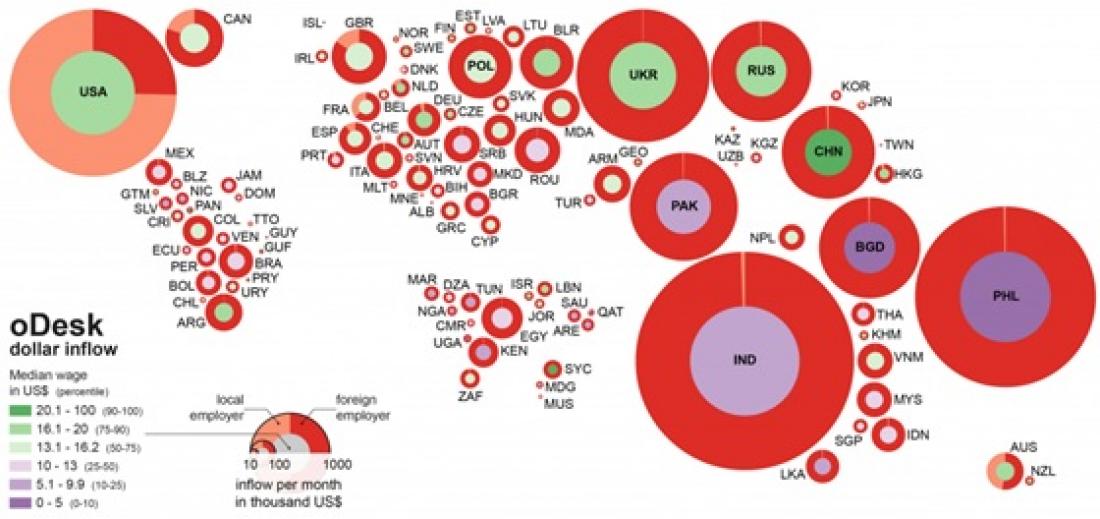Dollar inflow and median wage by country.
Just as online platforms such as Facebook and Twitter have rewired our social connections, a wave of digital service platforms is transforming the world of work. Through websites such as Upwork and Freelancer, service providers and buyers are connecting across the planet, negotiating millions of small contracts. This competitive “microwork” market covers pretty much any discrete task that can be done via the Internet, such as medical transcription, copywriting, web design and moderating social media sites.
In theory, microwork offers a wealth of opportunity for people in low-income regions. Countries such as India and the Philippines have already seen tremendous growth in the virtual service economy. But with no guaranteed hours or wages and few social protections, digital workers have little security. And as more and more companies turn to virtual outsourcing, stable jobs may disappear to be replaced by freelance contracts awarded to the lowest bidder.
"Is this a way to address unemployment in big swathes of the world or is it just creating digital sweatshops?" asks Mark Graham, a researcher and professor at the Oxford Internet Institute (OII). In partnership with a team from the University of Pretoria in South Africa, Dr Graham and colleagues at OII are leading a three-year study, supported by Canada’s International Development Research Centre, to look at how virtual production networks in Africa and South-East Asia are structured. They are examining who benefits, how they benefit, and possible ways that government policies might help youth and other vulnerable groups to benefit.
The research involves analysing data from leading microwork businesses, surveys of 2,000 contract service providers, and interviews with hundreds of digital freelancers. In South-East Asia, fieldwork is taking place in Malaysia, the Philippines and Vietnam.
Initial analysis of six months of data from oDesk – one of the world’s largest microwork platforms with 4.5 million registered workers, and now part of Upwork – reveals the geographic divide. The bulk of demand for online labour is coming from wealthy countries, with most of the work carried out in low-income countries. Among the 20 countries with the highest labour demand, only Malaysia (ranked 15th) and India (ranked 19th) are low income. Labour “sellers”, on the other hand, are mainly in emerging economies, with India and the Philippines providing much of the microwork sourced through oDesk. Wages also differ widely from North to South.
“The issue is not just a global race to the bottom, which in some ways seems to be occurring, but that there are different price floors for wages in different parts of the world and wage penalties associated with being affiliated with some countries,” says Dr Graham.
The team now aims to address many of the questions raised by its initial mappings, including what lies behind these patterns in the flow and compensation for digital work. Findings will ultimately be available through journal articles and an open data platform, and will feed into debates on what protections and rewards workers might expect in a fast-evolving digital labour market.
For further information contact:
Professor Mark Graham
Oxford Internet Institute, United Kingdom
E-mail: [email protected]
International Development Research Centre, Canada
E-mail: [email protected]



